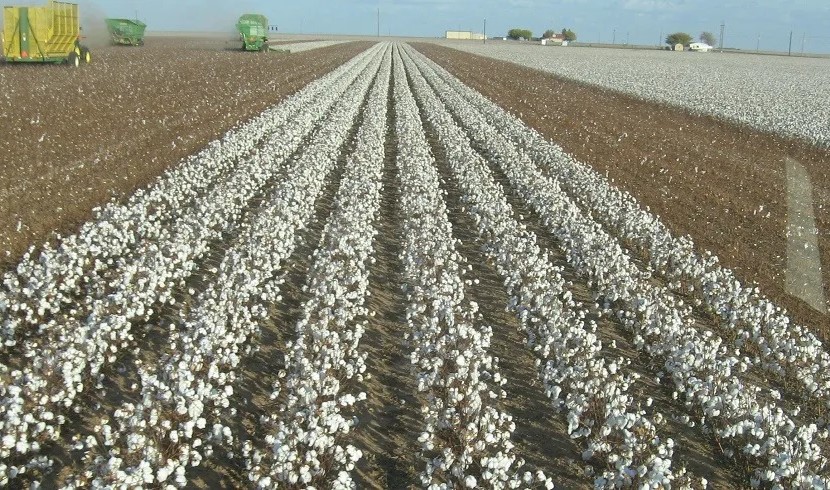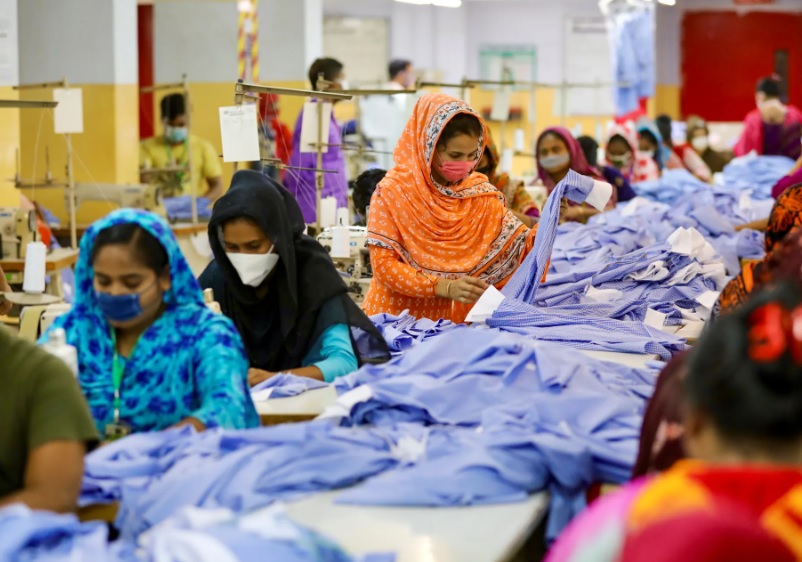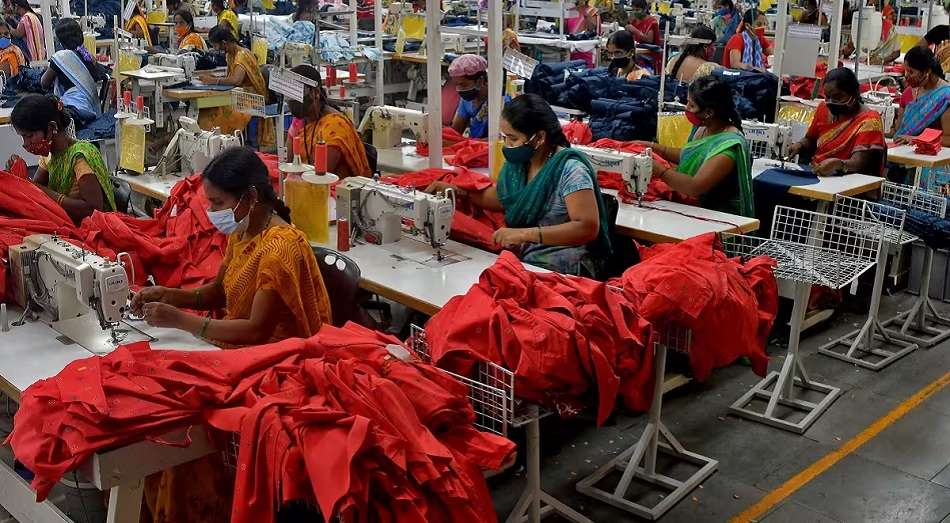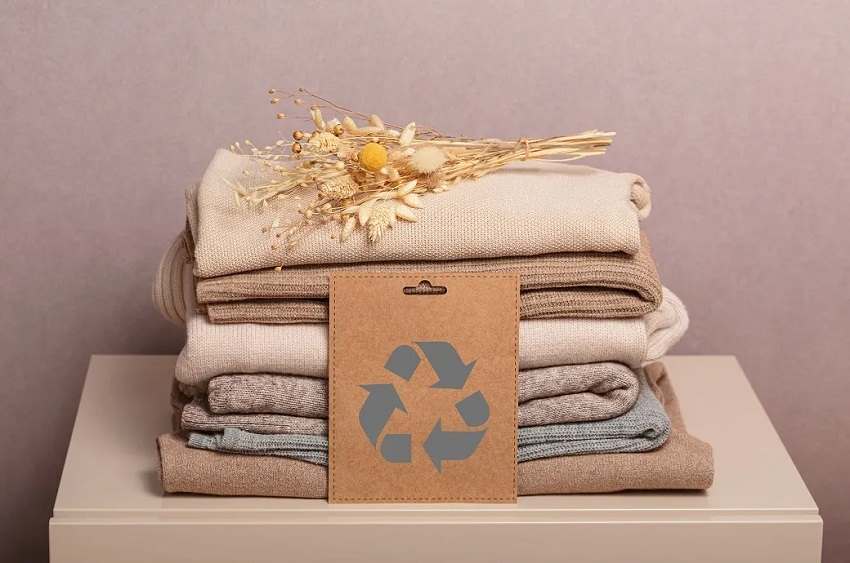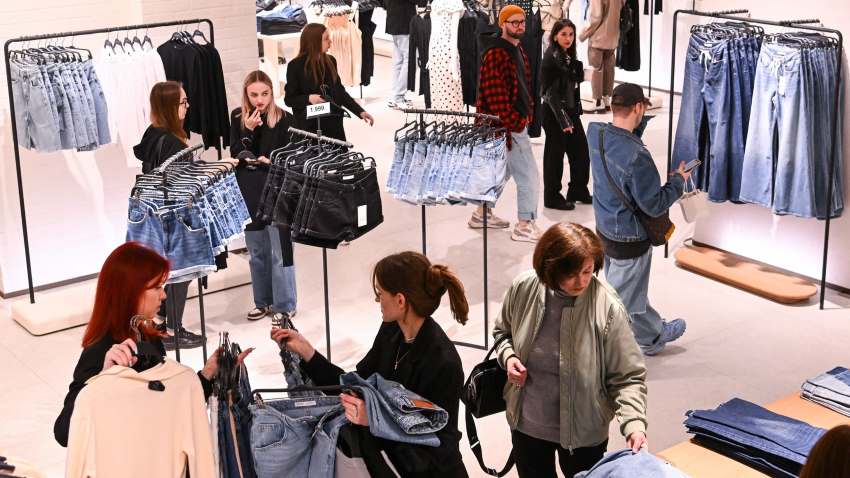A dangerous flammable fabric is being imported into the US that fails to meet basic fire standards. Put a lighter’s flame to the fabric and it ignites like a sparkler, dripping molten chemicals that burn into the surface of anything that its drips on. Normal polyester when held to a lighter will roll back on itself and when cooled the polyester becomes quite hard like a plastic.
The fabric is labeled as 100 per cent polyester, although silver-nano particles can be seen with the naked eye. Silver particles generally provide anti-microbial properties. Oddly, the test fabric has been marketed as stain-resistant instead of anti-microbial. The silver particles are not embedded and when ignited, the silver becomes airborne. The nano terminology that was used on the labeling to describe the finishing is totally misleading.
The label doesn’t say what abrasion material was used; cotton or wire, and how many pounds of pressure were used. In the early ’90s a synthetic georgette fabric was banned from import due to its high flammability. There are outdoor performance products which are labeled as containing CoolMax, a moisture wicking fabric developed by DuPont in 1986. However, what CoolMax actually is anyone’s guess.
The fifth edition of Spinexpo New York, held from July 16 to 18, 2013 saw knitwear designers, sourcing managers, retail buyers and brand directors explore an international offering comprising of fibers, yarns, knitwear manufacturing, trend direction and market intelligence.The three-day fair attracted 1,379 visitors, a 10 per cent increase over the 2012 edition. The majority of them represented major brands mostly from New York and surrounding states.
The exhibition showcased 82 exhibitors, who included fiber manufacturers, yarn spinners, knitwear and machine manufacturers, and design studios from China, Hong Kong, Japan, Taiwan, Indonesia, Mauritius, Italy, Germany, Turkey, France, the UK and USA.
Knitwear manufacturers with a variety of specialties added their expertise to the show.Some offered a complete vertical service from yarn to finished garment. A collaboration between machine manufacturer Shima Seiki and yarn spinner Nikko Textile created excitement at the interactive stand of PT JabaGarmindo, Indonesia’s largest knitwear manufacturer. The stand attracted a large number of visitors who could check the manufacturing quality of the Indonesian company.
The new ThiesiMaster F series from German Thies GmbH is destined particularly for dyeing high pile fabrics, such as terry toweling.The new F series is the latest innovation for the highly successful iMaster range of dyeing machines. It features a large transport winch inside the dyeing kier to be processed with significantly reduced elongation. It results in improved stability, perfect fabric condition and appearance, and ensures economic and environment-friendly operation with advanced automation at low liquor levels, as low as 1:4 for cotton.
The new models are available with capacities of between 250 kg to 400 kg per chamber. The iMaster F series can be delivered with up to maximum eight tubes for the 250 kg/tube, and six tubes for the 400 kg version. They are also able to process a wide range of different articles.
The new machine is equipped with a 100 per cent stock tank, a dosing tank and delivery system for dry salt and is particularly optimized for the production of terry articles. The automatic self-cleaning filter system always helps to achieve every time the same dyeing and treatment conditions. Manual interventions for cleaning are reduced and productivity is increased. Rinse, wash and dye baths are measured online, continuously analyzed and displayed graphically.
The National Tariff Commission (NTC) of Pakistan has decided not to impose anti-dumping duty on import of Polyester Staple Fibre (PSF) from China. The All Pakistan Textile Mills Association (APTMA) had been lobbying for it for a long time. The APTMA feels not imposing duty will have a positive impact on textile imports and will provide a long-term advantage to the textile industry, as polyester use is bound to increase. PSF is an important industrial material. However, the provisional anti-dumping duty continued for four months.
After value-addition on imported fibers, textile products are exported. Pakistan needs to import PSF in view of the acute domestic production shortfall of PSF. APTMA says imposition of anti-dumping duty operates against international competitiveness of Pakistan textile products predominantly meant for export.
Imposition of anti-dumping duty on industrial raw material besides making imports costlier have the effect of raising domestic raw material prices to a level where they become unviable for the textile industry. However, the domestic PSF industry was vociferous in pleading for imposition of anti-dumping duty as it gives the industry an amount of protection by which it raises domestic prices.
All Pakistan Textile Mills Association is the premier national trade association of textile spinning, weaving, and composite mills representing the organized sector in Pakistan. It represents 396 textile mills, out of which 315 are spinning, 44 weaving and 37 composite units.
Executives in the apparel sector and agents in RMG trade in the US believe that the cost of clothing will rise in the coming months as a sequel to the Rana Plaza collapse. After the Rana Plaza incident, operational costs of garment factories in most exporting countries mainly Bangladesh, has risen.The reasons include: spending extra money in improving safety standards and meeting worker’s demand for higher wages.
The overall rise in clothing cost will equally hurt manufacturers and consumers. It is likely to curtail profits margin of garment companies, as they may not be able to raise retail prices, fearing the shoppers' backlash.
Leading brands and retailers in Europe, the US and Canada, who buy garments from Bangladesh, have taken separate but identical multi-million dollar projects to improve safety standards and workers' rights in local garment factories over the next five years.
In the wake of tragedies in the RMG sector, global retailers including Wal-Mart, GAP and Abercrombie & Fitch have pledged various moves to improve workers' safety. Bangladesh is the second largest garment exporter of the world after China, controlling about 20 per cent of the total US apparel import with a dramatic share increase in the recent years.
Shanghai will host Planet Textiles Conference on October, 22, 2013. Jointly organized by Ecotextile News and Messe Frankfurt, Planet Textiles tackles the crucial issue of sustainability in the global textile sector.Now in its fifth year, Planet Textiles is Asia's premiere annual event dedicated to reducing the impact of textiles on the environment.
The head of sustainability at leading Chinese textile mill Jiangsu Lianfa will give a real-world example of environmental and cost savings for a Chinese textile mill through implementation of simple environmental-led steps. Previous attendees at Planet Textiles include: senior executives from Nike, H&M, Wal-Mart, Levi Strauss, Puma, VF Corp, Adidas, H&M, Marks & Spencer, Esprit, Pacific Textiles and Warnaco, to name a few.
Planet Textiles will take place within the same venue as Intertextile Shanghai Apparel Fabrics, Asia’s leading sourcing exhibition, which attracts more than 60,000 visitors. This year, the link between Planet Textiles and Intertextile Shanghai Apparel Fabrics will be strengthened through an innovative new “all about sustainability” zone. This new area of the show will feature three sections: exhibitors: sustainable fabrics producers, and dye and chemical companies; educational Zone: sustainability testing certifiers, trade associations, NGOs and eco publications; display area: recycled fabrics, products, solutions and initiatives.
A New Zealand-based Woolyarns produces an exclusive range of luxury yarn brand for both textile manufacturing and hand knitting markets internationally.It is Woolyarns’ Zealana hand knitting yarn. Zealana uses luxuriously soft and lightweight blended Brushtail possum fiber. It is spun into beautiful yarn that is sought after by handknitters.
Brushtail possum fiber is super soft and prized for its lightweight warmth and breathability. Possum for Zealana yarn is collected from a small number of carefully selected regions, only at certain times of the year. It is then blended with the finest merino or cashmere to guarantee softness and consistency in this high end luxury yarn. Woolyarns uses 40 to 50 tons of possum fiber annually across its product range. This is equivalent to the fiber from more than one million possums.
Woolyarns was established 68 years ago. For several decades, it provided yarns only for commercial purposes. In the early 1990’s, it pioneered the use of possum fiber mixed with wool. In 2006, Woolyarns released Zealana, its first hand knitting and crochet yarns.
Woolyarns offers a select niche range of bespoke yarns, in addition to its classic range. Luxury yarn brands in Woolyarns’ portfolio of bespoke yarns are Zealana (hand knitting), Perino (knitwear, apparel, hosiery yarns), INZpire (carpet yarns) and Callibra (sourced yarns).
As financial results reporting season gains momentum, investors in textile sector are looking to splendid growth in profitability, which would probably match the financial year 2013 performance. Profitability of textile (sample firms) scaled four-fold to Rs22.8 billion in three-quarters of financial year 2013 (9MFY13) as against Rs4.4billion in the same period last year.
“Last fiscal year, FY-’13, was one of the better years for Pakistan textile sector in terms of sales and profits which was also reflected in more than 100per cent price performance of our sample listed textile firms with market capitalization of over Rs25 million,” says ZeeshanAfzalof Topline Securities.
Though shortage of power remained the perennial problem, especially in winter, the textile companies’ jump in profits by 400per cent was mainly attributed to stable cotton prices and strong regional demand.
Moreover, continuous depreciation of rupee against the dollar and cheaper financing also contributed to hefty earnings growth. In FY-’13, Pakistan exported $13bn worth textile products, up by 5.9per cent in dollar terms but represented improvement by 14.7per cent in local currency due to the drop in value of the rupee.
The growth in exports was attributed mainly to imposition of cotton floor price in China that encouraged Chinese textile manufacturers to import more yarn and grey cloth instead of converting yarn into costly local cotton.As a result, Pakistan’s yarn and grey cloth exports increased by 24per cent and 10per cent to $2.2billion and $2.7billion, respectively, in FY-’13. The latest results of textile sector are expected to show continuous growth in export for FY-’14 on the back of sustained textile demand from China and substantial depreciation in local currency.
However, analysts caution that much would depend upon international cotton prices, though major volatility was unlikely to be seen in local cotton prices in FY-’14. The encouragement was based on estimates of Cotton Crop Assessment Committee (CCAC) which estimated Pakistan’s cotton production at 13.25million bales in FY-’14, slightly higher over the 13.0 million bales produced by the country in FY-’13.
Exports and profits of the sector could also improve due to expected Generalised System of Preferences (GSP Plus) status from EU, as lower import duties would provide Pakistan a competitive edge in international markets. “Further operating environment of the textile sector may see further improvement in low interest rate scenario,” analysts said, the caveat, however, being the all-important improvement in energy situation.
The 2013 ThéophileLegrand International Prize for Textile Innovation will be awarded on October 5 at ValJolyEppe-Sauvage resort.The ThéophileLegrand Foundation – Institut de France was created in 2007 by Christian Cambier, a descendant of ThéophileLegrand. ThéophileLegrand is the founder of the wool industry in Fourmies, France.
Since 2009, two ThéophileLegrand awards are granted annually. With a value of €18,000, these two awards celebrate two distinguished researchers and/or students who have created original material, fiber or fabric in the field of technical textiles; or an innovative textile design and/or a new textile industrial production technique.
The goal is to foster innovation, research, and imagination by showcasing emerging technical and industrial creations. In 2009, the prize was awarded to AurélieCayla for inventing a smart textile that senses specific temperatures. In 2011 Munir Ashraf won it for creating a self-cleaning and antibacterial textile. Last year, Pierre-Alexandre won the prize for a decontaminating textile to treat air and water.
An innovative textile design project can be submitted for consideration providing the entrant or team of researchers is able to prove that the project, product and the invention of newly used elements are their own work. Selection criteria are the same for inventors of new textile fabrics as well as innovators of new processes of textile production. All entrants are judged on their creativity, originality, innovation to the field and the project’s ability to be industrially reproduced.
Turkey’s textiles exports, excluding apparels, has seen an increase if 6.6 percent in the first six months of 2013 compared to the corresponding period of last year.Turkish firms exported $4.164 billion worth of textiles to other countries during January to June 2013, accounting for 5.6 percent of total Turkish exports.
Segment-wise, woven fabric exports earned $1.436 billion, followed by knitted fabric which fetched $845.6 million. Yarn exports from Turkey were worth $838.5 million, while fiber exports amounted to $307.8 million from January to June 2013. Exports to the EU accounted for 45 percent of all Turkish textile exports during the six-month period.
Turkish textile exports rose to $7.75 billion in 2012 from $7.7 billion in 2011. Turkey exported textiles worth $542.2 million to Russia, $418.2 million to Italy, and $213.8 million to Germany during the first quarter of 2013.
- 1
- 2
- 3
- 4
- 5
- 6
- 7
- 8
- 9
- 10
LuxExperience: How the Mytheresa-YNAP merger will reshape online luxury retail
The digital scenario of luxury retail has irrevocably altered with the successful completion of Mytheresa's acquisition of Yoox Net-a-Porter (YNAP)... Read more
US Apparel Imports: Scenario changes subtly as China's dominance reduces
For years, China reigned supreme as the undisputed king of US apparel imports. While still the largest supplier in aggregate... Read more
US Apparel Imports: Scenario changes subtly as China's dominance reduces
For years, China reigned supreme as the undisputed king of US apparel imports. While still the largest supplier in aggregate... Read more
Built to Break: Is our ‘waste problem’ just a design flaw?
The air in numerous pockets of the country hangs thick with the stench of discarded refuse, a stark testament to... Read more
From Importer to Global Leader: Brazil’s cotton revolution
Brazil’s ascent from a net cotton importer to the world’s largest cotton exporter is one of the most compelling success... Read more
The Unraveling: How Bangladesh's economic crisis threatens its global apparel do…
Bangladesh, a global apparel exports powerhouse, finds itself grappling with a complex economic crisis that is increasingly impacting its ready-made... Read more
US Cotton: Shifting dynamics amidst reciprocal tariffs and quality advantages
The US has long held a dominant position in the global cotton market, thanks to its reputation for producing high-quality... Read more
India’s textile and apparel industry sees mixed fortunes in FY25: Wazir Indices
India’s textile and apparel sector showed mixed results in FY25, with growth momentum visible in sales but profit metrics showing... Read more
UK charts course for circular fashion leadership with new CFIN roadmap
A new landmark report released by the Circular Fashion Innovation Network (CFIN) outlines major strides and a comprehensive roadmap for... Read more
The Unseen Cost of Fashion Returns: Undermining sustainability efforts
Fashion brands are increasingly vocal about their commitment to sustainability, proudly unveiling initiatives centered on recycled polyester, reduced water consumption... Read more




